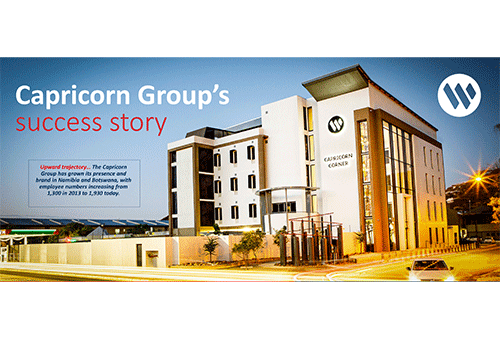The Capricorn Group remains one of the most valuable stocks on the Namibian Stock Exchange (NSX), with a market capitalisation of N$8.56 billion.
Listed on the NSX in June 2013, Bank Windhoek Holdings, later renamed Capricorn Investment Group Limited in 2016 and then Capricorn Group Limited in 2020, had a market capitalisa-tion of N$5 billion and was the second-largest local counter on the exchange. The Group has been well-capitalised through-out the last ten years, acquir-ing a share price increase from N$8.75 since the listing to N$16.50 as of 31 October 2023.
“Our aim with the listing was to create prosperity for Namib-ians, contribute to the nation’s economic growth and unlock value for our employees. To-day, we are widely recognised as a transparent and responsi-ble corporate citizen creating value for all our stakeholders. Almost all our shareholders are Namibian, with 99.8% of total shareholders being Namibian residents. In the decade since we listed, we have paid more than N$3 billion in dividends to shareholders,” the Group stat-ed in its Integrated Annual Re-port of 2023.
The Capricorn Group has deliv-ered strong growth despite the decade’s economic headwinds. It continues to balance the of-fering of attractive returns for shareholders with retaining the capital to drive growth and di-versification. When the Group was listed, it generated a reve-nue of N$1.4 billion, compared to N$4.6 billion for 2023. The Group had total assets of N$21 billion and net assets of N$2.6 billion (including the proceeds from the public offer at the time of the listing: N$355 mil-lion) compared to N$63 billion total assets and N$8.3 billion net assets in 2023. The Group has also grown its presence and brand in two countries, with employee numbers increasing from 1,300 in 2013 to 1,930 to-day due to acquisitions during the period.
“I thank our employees and management teams for deliv-ering excellent financial results despite a difficult operating en-vironment and significant tech-nological hurdles. It is a privi-lege to lead the Group board and interact with directors who bring varied perspectives to our challenges and opportunities,” said Capricorn Group Board Chairperson Gerhard Fourie.
Group CEO Thinus Prinsloo said: “The past few years have taught us the importance of prepared-ness and anticipating the un-expected. We have learned, grown, and adapted to a rapidly changing world, as we are now more aware of the significance of adaptability in business. In 2024, we will continue focusing on our purpose and executing our strategy, which remains a critical differentiator. When we stay true to our purpose, our priorities gain traction, leading to increased focus, better exe-cution, and overall success for the Group. Our new strategic cycle, which kicked off in July 2023, will allow us to refine and refocus our efforts.”
For Group Chief Financial Offi-cer Johan Maass, the strategic focus also includes ensuring a strong return on investment (ROE). “We track ROE over time as a measure of our overall suc-cess in delivering shareholder returns. We will continue devel-oping the strength of our diver-sified operations and revenue streams while investing in dig-ital transformation to improve the customer experience to sustain and boost ROE. Accord-ing to the Bank of Namibia, the banking sector’s profitability, as measured by ROE, increased to 15.7% at the end of 2022 from 13.9% at the end of 2021. Capri-corn Group achieved an ROE of 17.6% (2022: 15.0%),” he said.
Value creation
Meanwhile, the Capricorn Group and its subsidiaries have stepped up their Corporate So-cial Responsibility (CSR) efforts during the 2022/2023 financial year by spending N$21,7 mil-lion towards making a positive difference in the community in both Namibia and Botswana. The substantial investment in-creased by more than N$5 mil-lion, considering N$16,3 million was spent on CSR during the 2021/2022 financial year.
“From facilitating the e-learn-ing experience for children in remote areas of Namibia to employees donating textbooks and stationery to vulnerable learners, our CSR initiatives re-flect our determination to be Connectors of Positive Change. Since the Foundation’s incep-tion in February 2020, it has acted as a driver of the Group’s CSR vision and has identified key focus areas that will enable us to have a positive impact on people, including early child-hood development (ECD), qual-ity education, food security, and job creation,” said Gerhard Fourie, Chairperson of the Cap-ricorn Group.
During 2022/2023, the Group spent nearly N$3 million on education and training-relat-ed initiatives, N$1,5 million on economic advancement projects and N$2,2 million on vulnerability programmes. On health-related programmes, Capricorn forked out N$1,6 mil-lion and N$781 500 on sustain-ability.
“We are a socially responsible Group that is strongly obliged to its stakeholders. In keeping with our brand promise of being Connectors of Positive Change, we take pride in the value we create through our CSR initia-tives by positively impacting lives,” said Marlize Horn, the Executive Officer of the Capri-corn Foundation, which is the main vehicle of the Group’s corporate social responsibility initiatives.
The Capricorn Foundation was established in February 2020 by Capricorn Group as a non-profit association incorporated under Section 21 of the Company’s Act in Namibia and is a registered Welfare Organisation (WO499). The Foundation is funded by the Group’s subsidiaries, includ-ing Bank Windhoek, Capricorn Asset Management (CAM) and Entrepo. “In its third year, the Foundation expanded its reach across the regions of Namibia, growing our list of beneficiaries and initiatives within our select-ed focus areas. We also took on our very first signature project, the Capricorn Foundation Food Waste Challenge, which has enabled us to address the food security crisis in the country. The work we do is more than just about signing a cheque. We consider the Namibian CSR landscape to understand the key role players, what socio-economic challenges are being addressed and where we can work and collaborate with part-ners. The Foundation is seen as a thought leader open to collaboration, and we want to reinforce this by fostering new networks within the private and public sectors,” Horn added.


